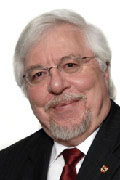Latest News Archive
Please select Category, Year, and then Month to display items
12 January 2024
|
Story Nonsindiswe Qwabe
|
Photo Sonia Small
 Since joining the UFS in 2008, Dr Grey Magaiza has worked extensively on approaches that can foster the socio-economic transformation of societies.
Since joining the UFS in 2008, Dr Grey Magaiza has worked extensively on approaches that can foster the socio-economic transformation of societies.
“The future should be one where communities can decide on their development agenda and futures. That’s the most important for me.” Dr Grey Magaiza, Deputy Director of the Centre for Gender and Africa Studies (CGAS) and Head of the Community Development programme on the Qwaqwa Campus, is passionate about capacitating communities to be agents of change and advancement. His vision for the future emphasises the empowerment of communities to take charge of their development by actively participating in decision making and the implementation of development projects that can improve their lives.
Since joining the UFS in 2008, Dr Magaiza has worked extensively on approaches that can foster the socio-economic transformation of societies. Over the years, he has crafted his research speciality into one that he is most proud of – being an interdisciplinary scientist immersed in the development of communities.
“I’m in a fortunate position of researching what I like. I say ‘fortunate’, because I’ve taken the time to understand what I’m passionate about, which is the overall field of rural livelihoods and livelihood futures – in short, community development. My research starts from an engaged university, understanding the elements that a university must use to enhance transformation and relevance to its immediate community in terms of development.”
One of the ways he has done this is by looking at social entrepreneurship as a development approach for young people in a rural setting. Through workshops with non-profit and civic organisations in Qwaqwa, Dr Magaiza has been helping these organisations to map out their needs and actively meet them through the involvement and support of external role players.
“We understand that communities are part of the national development agenda, but even that national agenda respects community knowledge and intentions and allows communities to shape their identity. A critical enabler of this is community organising. You bring back the capacity in communities to have dialogues on issues affecting them as spaces for engagement, knowledge exchange, and for people to just talk about their way forward.”
By enabling communities to define their development agenda, they can address their specific needs, challenges, and aspirations, he said. “When I look at livelihood futures, it’s quite an exciting aspect of my work – it’s like looking into a fortune tellers’ globe, because you’re not deciding for communities what they should do, but the communities themselves take those decisions.”
Institute of Advanced Legal Studies appoints the Dean of our Faculty of Law as Senior Associate Research Fellow
2010-12-07
 |
| Prof. Johan Henning |
|
The Institute of Advanced Legal Studies in London appoints the Prof. Johan Henning, Dean of our Faculty of Law, as Senior Associate Research Fellow.
The Institute of Advanced Legal Studies at the University of London in the United Kingdom has conferred the title of Senior Associate Research Fellow on Prof. Johan Henning, Dean of our Faculty of Law, for the 2010-11 academic year.
This Fellowship will enable Prof. Henning to benefit from library and other facilities equivalent to those enjoyed by staff members of the institute. By accepting this honour, Prof. Henning joins the likes of staff members from Bergen University in Norway, the University of Cambridge and the University of Victoria in British Columbia.
Photo: Dries Myburgh
Media Release
10 December 2010
Issued by: Lacea Loader
Director: Strategic Communication (actg)
Tel: 051 401 2584
Cell: 083 645 2454
E-mail: news@ufs.ac.za